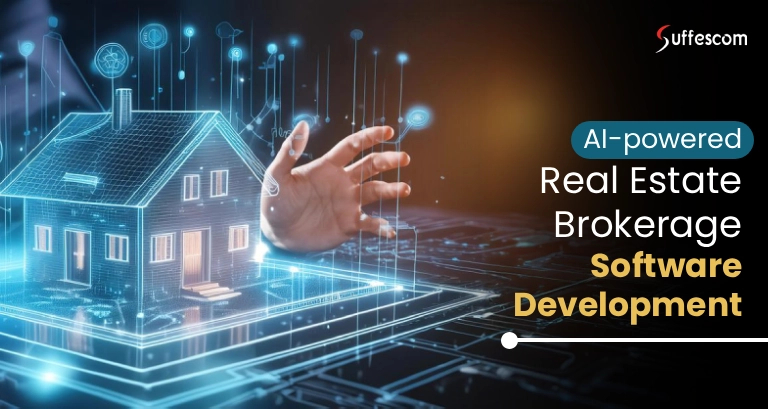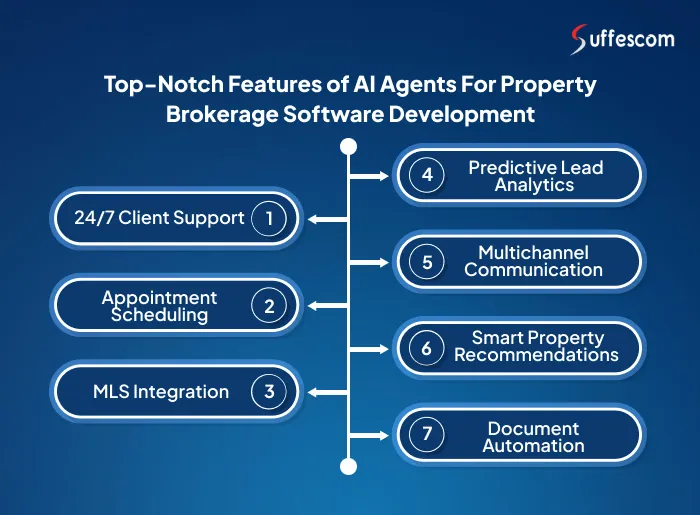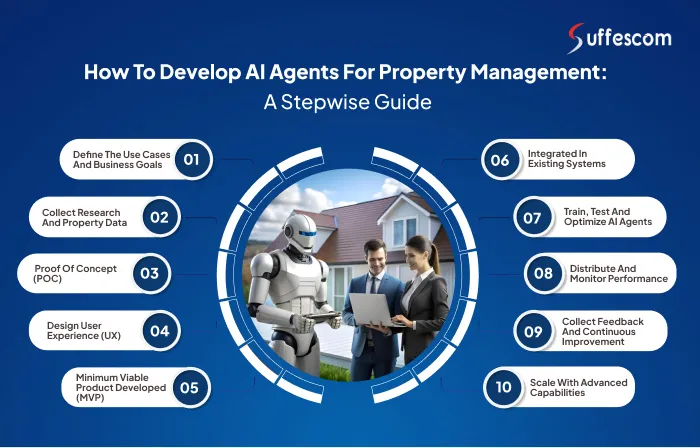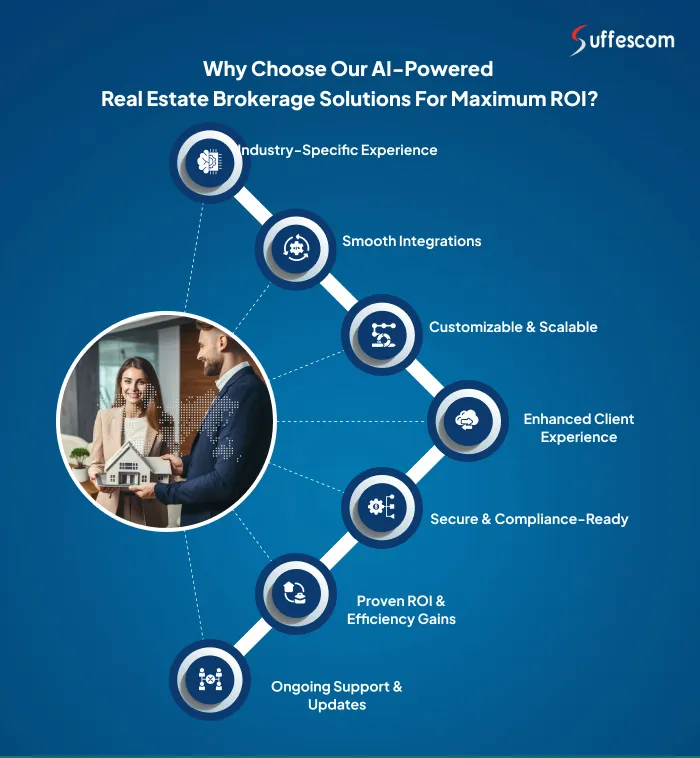
The real estate industry is undergoing rapid change, and AI is evolving. From automating routine tasks to facilitating intelligent client interactions, AI-powered real estate software development transforms how agents and brokers operate.
One of the most influential innovations is an AI real estate assistant. This innovative digital solution can handle client surveys, manage agreements, verify qualifications, and even recommend properties based on user preferences.
According to The Business Research Company, it is expected to grow to $975.24 billion by 2029 with a CAGR of 34.1%.
To explore how AI can transform your real estate business and harness this rapid growth, let’s take a deeper dive into its capabilities and benefits.
An AI real estate brokerage system is a digital platform that automates core brokerage operations while delivering intelligent insights. By combining automation, data analytics, and natural language processing, these systems allow brokers to:
Whether you are an independent agent or a large brokerage, integrating an automated real estate AI brokerage system helps improve efficiency, lead conversion, and overall client satisfaction.
Streamline workflows, reduce manual tasks, and deliver intelligent insights for brokers and agents across all property types.
We create an effective AI property brokerage software system and integrate automation, predictive analytics, and AI workflows to automate tasks for agents while maximizing client satisfaction. Below is a comprehensive breakdown of each feature:

It enables seamless support for clients through chatbots, virtual assistants, or voice-based interfaces. Powered by natural language processing (NLP) and conversational AI architectures such as Dialogflow, Rasa, or OpenAI GPT, it handles inquiries, assists users through property listings, and identifies intent to deliver contextual feedback at any time.
It identifies high-intent leads automatically through machine learning classification models, which compare behavior patterns, previous interactions, and demographic information. Predictive analytics score leads by probability of conversion, allowing agents to set their priorities and maximize ROI.
It automates property viewing bookings and reminds clients and agents. It synchronizes with calendar APIs, such as Google Calendar and Microsoft Outlook, utilizing workflow automation to manage time slots, rescheduling, and conflicts. AI optimization enables effective scheduling based on agent availability and client preferences.
It provides facilities for interaction on many websites, mobile applications, SMS, e-post, WhatsApp, and Social Media. Through omnichannel communication platforms and API functionalities, such as Twilio or WhatsApp Business API, interaction is centralised, integrated, and logged to ensure a smooth customer experience.
We integrate features that enable AI real estate brokers to gain real-time access to MLS property listings. By pulling accurate data via RESTful APIs or GraphQL, agents can instantly deliver updated property insights to clients, enhancing discovery and decision-making.
This function makes software more attractive by recommending a list of properties based on client preferences, browsing history, and budget. AI utilizes collaboration filtering, material-based recommendation algorithms, and reinforcement learning, which promote lead commitment and conversion, to deliver personalized recommendations.
Reduced manual paperwork and efforts of real estate brokers by automating the whole process, such as contract generation, automating disclosures, and agreement preparation. It depends on document generation platforms such as DocuSign API and Optical Character Recognition (OCR); AI dynamically fills out fields and maintains compliance with legal requirements.
Whether you need a POC or a full launch, we help you develop an AI real estate brokerage system that’s scalable and future-ready. We follow a structured process that ensures your system is effective, scalable, and user-friendly.

AI agents should begin by identifying the problems to solve, such as management, asset recommendations, document automation, or customer engagement, to be addressed. Underline seemingly business goals, such as an increase in conversion frequency, a reduction in operating costs, or an increased customer experience.
Data is the backbone of any AI system. Collect MLS list, CRM posts, client inquiries, and market trends. Ensure your dataset is clean, diverse, and up-to-date to enable accurate AI-driven predictions and personalized client interactions.
Develop a light prototype to validate your AI solution. For example, a chatbot that handles common questions or a contract plan integrated with the calendar. A POC helps test technical feasibility, user experience, and AI accuracy before a full-scale development.
Provide map conversion flow, design an intuitive interface, and ensure compatibility with multiple devices. Focus on the purpose so that agents and customers can interact naturally with AI, increase adoption, and commitment.
Make the first functional version with core functions: lead catch, real estate search, planning, and basic document automation. Start quickly to gather the user's answers and validate the effectiveness of your AI model in real-world scenarios.
We integrate customized and readymade real estate AI agents with CRM platforms (HubSpot, Salesforce), MLS databases, and calendar systems. Integration ensures synchronized data, smooth workflows, and increased productivity in tables.
By using machine learning algorithms, NLP, and predictive analytics to train real estate AI agents, and feeding historical data, real-time conversations are used in the model. Intentions do extensive tests for recognition, edge cases, and the reliability of the system.
Developing AI real estate agents for web, mobile and message platforms to evaluate commitment, response accuracy, conversion, and system viewing, you must monitor the agreement's completion rate.
Collect input from agents, customers and system analysis. AI-call flight, recommended automation of engine and workflow to ensure continuous increase in functionality and customer satisfaction.
Add features such as voting-competent interactions, multilingual support, future price pricing, and an agent dashboard. Scaling converts AI agents into a strategic feature that increases mediation efficiency and market competition.
By choosing to develop AI agents for property management, brokerages can enhance client engagement, automate workflows, and achieve measurable productivity gains.
When companies choose to develop AI agents for real estate management, common tasks such as MLS lists, document verification and onboarding are completely automated. It gives agents more time to focus on final offers.
With AI agents for the development of real estate software, high-enthusiast mediation can automatically qualify, send individual follow-up messages, and promote total customers to achieve higher conversion frequencies.
An AI-powered real estate brokerage software development system treats a large-scale data set and analyzes buyer behaviour, real estate values , and market dynamics to provide real-time price and investment insights.
By leveraging AI real estate software development, customers receive personalized real estate recommendations tailored to their lifestyle, budget, and preferences. It improves satisfaction and loyalty
An automated real estate AI brokerage system reduces administrative overhead by automatic scheduling, match checks, and paperwork, significantly reducing operating costs.
AI-powered broker tools allow agents the opportunity to manage more entries at the same time, strengthen communication, and achieve a high return without scaling the workforce.
For secure document management from GDPR/CCPA contamination, AI has a broker operation that is accurate, transparent, and in legal compliance.
Automate scheduling, lead qualification, and client communication to enhance efficiency and drive higher returns.
Building a reliable AI-powered real estate brokerage software development solution requires the right blend of frameworks, tools, and integrations.
| Component | Purpose & Tools | How It Supports AI Real Estate Brokerage |
| Programming Languages | Python, Java, Node.js | Powers backend operations, AI logic, and integration of AI agents for property brokerage software development. |
| Frontend Frameworks | React.js, Angular, Vue.js | Builds responsive, user-friendly interfaces for brokers and clients. |
| AI & ML Models | TensorFlow, PyTorch, Scikit-learn | Enables predictive analytics, smart property recommendations, and lead qualification. |
| NLP & Conversational AI | Dialogflow, Rasa, OpenAI GPT | Powers chatbots and voice assistants for real estate brokerage automation software development. |
| Databases | PostgreSQL, MySQL, MongoDB | Stores client information, property listings, chat history, and transaction records efficiently. |
| Cloud & Hosting | AWS, Google Cloud, Microsoft Azure | Ensures secure, scalable deployment of AI-powered real estate brokerage software development platforms. |
| Integration APIs | MLS, CRM (Salesforce, HubSpot, Zoho) | Synchronizes property listings, client leads, and appointments to streamline workflows. |
| Communication & Engagement | Twilio, WhatsApp Business API, SendGrid | Facilitates multichannel client interaction, notifications, and follow-ups. |
| Security & Compliance | OAuth 2.0, JWT, SSL, GDPR/CCPA frameworks | Protects sensitive data, ensures compliance, and maintains trust with clients. |
| Document Automation | DocuSign API, HelloSign, OCR | Automates contracts, disclosures, and agreements, reducing manual work. |
The cost of building AI real estate brokerage software depends on many factors:
1. Scope and features: Platforms with advanced features such as predictive analysis, multilingual support, MLS integration, and document automation will require high investments.
2. Development approach: A tailor-made AI real estate brokerage system, a white -marked solution, or the range between a minimum viable product (MVP) affects the total cost.
3. Integration requirements: CRM, calendar, MLS database, and spontaneous integration with communication equipment are combined in complication and costs.
4. AI model complexity: Advanced machine learning models for lead qualifications, voice interaction, and asset recommendations can increase the time and investment.
5. Platform and Deployment: The cost varies depending on the grid, mobile, or transverse platform requirements, as well as scalability considerations.
6. Maintenance and update: Continuous AI optimization, convenience upgrading, and security compliance require ongoing budget distribution.
PropTech startups and smart investment platforms can leverage Real Estate Tokenization Development to build secure, tokenized property markets integrated with our AI-powered brokerage systems.
Residential brokers are assisted by AI agents in matching buyers with suitable homes, automating lead follow-up, and providing personalized property suggestions. It's utilized in sales, rentals, and virtual property tours.
For office buildings, retail spaces, and industrial properties, AI platforms analyze market trends, provide pricing recommendations, and automate tenant management to help brokers make informed investment decisions based on data.
AI solutions automate rental portfolios by streamlining maintenance requests, monitoring rent collection, occupancy tracking, and tenant communication. Businesses aiming to develop a property management app can leverage these AI-driven features to enhance operational efficiency and tenant satisfaction.
Startups employ AI for predictive analytics, seller-buyer matching, and automated property valuations. This enables them to develop scalable platforms with less human intervention.
AI agents book automatically, handle guest communications, and suggest properties based on tastes, maximizing occupancy and revenue for short-term rental companies.
Big brokerages utilize AI across multiple offices to manage all leads, handle documents, and deliver client interaction uniformly in terms of quality and scalability.
AI assists in analyzing user behavior, qualifying leads, and operating customized campaigns. Companies can monetize platforms by providing subscription-based access or pay-per-lead schemes.
Governments and urban developers utilize AI agents for tracking property registrations, managing public housing, and providing citizens with real-time property information.
Implementing various AI-driven revenue strategies enables brokerages to boost earnings while enhancing efficiency.
Offer monthly or annual plans giving access to AI-powered tools, automated lead management, and property recommendations. Developing AI agents for property management ensures recurring revenue while enhancing productivity.
Charge brokerages for qualified leads generated by AI scoring and client intent analysis. This AI real estate brokerage software development model links revenue directly to results.
Offer basic free features with optional premium upgrades, including predictive analytics, MLS integration, and document automation. This strategy encourages adoption and gradual conversion.
Track transactions and facilitate revenue sharing from deals closed using AI-driven tools. An automated real estate AI brokerage system ensures transparent and fair commission collection.
Allow property developers or agents to promote listings within the platform. AI agents for property brokerage software development can personalize these ads to increase engagement.
Provide anonymized market insights, predictive trends, and performance reports to investors or partners. These AI-driven analytics add value and generate an extra revenue stream.
Develop AI real estate brokerage systems that integrate predictive analytics, smart property recommendations, and automated workflows.
Stay ahead in the market by leveraging emerging AI innovations to develop AI in real estate brokerage systems that transform client engagement and streamline operations
AI brokers for real estate brokerage software development will increasingly rely on predictive models to forecast property prices, rental behaviour, and investment potential. This enables agents to offer advice based on data to customers.
Virtual tours driven by AI will be the norm, enabling future buyers to visit properties from afar. Real estate brokerage automation software development will integrate VR/AR with AI-driven suggestions for personalized experiences.
AI voice assistants will address client inquiries, schedule appointments, and offer property suggestions. Creating AI agents for property management guarantees 24/7 support and hands-free interaction.
AI platforms will guide investors by examining portfolios, recommending property investments, and forecasting returns. Create AI platforms for real estate brokerage to facilitate automated decision-making for high-net-worth clients.
Next-generation systems will have IoT sensors, smart home information, and city planning data integrated into them, allowing AI real estate brokerage software development to provide live property information and prescriptive maintenance alerts.
AI will personalize property suggestions, advertising campaigns, and alerts based on unique client actions and tastes. This guarantees greater engagement and conversion.
AI platforms will review energy efficiency, ecological footprint, and sustainability aspects of properties, making buyers environmentally sensitive choices while improving the value proposition of brokerage platforms.
We deliver scalable, compliant, and user-friendly AI platforms tailored for residential, commercial, and rental brokers. With deep expertise, we help businesses build AI platforms for real estate brokerage that drive measurable ROI.

Our developers are experts in creating AI real estate brokerage systems that are tailored to residential, commercial, and rental market segments. By leveraging AI development services, we ensure that each solution is customized to the specific workflows and challenges unique to your industry.
A brokerage platform will integrate into your current ecosystem. Our solutions plug in seamlessly into MLS databases, CRM systems such as Salesforce or Zoho, and calendars. It creates a cohesive hub where agents and clients can work together.
With the expertise of a top AI agent development company, our software delivers scalable and flexible property brokerage solutions. We ensure seamless performance for small agencies and large enterprises according to their needs.
In today’s competitive market, customer satisfaction defines success. With AI-powered property recommendations, intelligent chatbots, and automated scheduling, our platforms personalize every interaction and strengthen long-term client relationships.
Real estate is all about sensitive financial and personal information. Our offerings are GDPR, CCPA, and local property law compliant, ensuring role-based access controls that protect information. It is making all automated real estate AI brokerage systems secure and future-proof.
Brokerages using our property management software development solutions see faster lead conversions, streamlined property management, and measurable savings on operating costs. Automating routine tasks helps close more deals in less time while maximizing ROI.
Technology changes, and so must your platform. We deliver ongoing monitoring, periodic updates, and AI optimization solutions that keep your AI-driven real estate brokerage software development competitive and ahead of emerging trends.
AI-powered real estate brokerage software development leverages predictive analytics, natural language processing, and user behavior tracking. It identifies high-intent leads, responds instantly to client queries, and provides personalized property suggestions. This targeted approach ensures prospects receive timely and relevant recommendations, increasing the likelihood of conversion.
Yes. Modern AI agents for property brokerage software development can integrate seamlessly with popular CRM systems, such as HubSpot, Salesforce, or Zoho, as well as MLS databases. This integration centralizes client data, ensures real-time property listing updates, and automates workflows, making your brokerage operations more efficient and error-free.
Yes. Automated real estate AI brokerage systems use real-time data analytics, historical property trends, and predictive algorithms to provide insights on pricing, demand, and investment opportunities. These insights enable brokers and agents to make data-driven decisions, provide accurate advice to clients, and stay ahead in a competitive real estate market.
Absolutely. Automated real estate AI brokerage systems are very scalable. Small independent agents can benefit from streamlined lead control and assets recommendations, while upgraded analyzes, multi-agent support, and integration to optimize operations in large business areas.
Implementing AI real estate brokerage software development often results in measurable improvements: higher agent productivity, reduced operational costs, faster deal closures, and better lead conversion rates.
Yes. Safety and compliance are essential in AI-driven real estate software development. These platforms comply with GDPR, CCPA, and local real estate regulations. The data is encrypted, access is controlled, and client information is securely stored, ensuring privacy and compliance with legal requirements.
Absolutely. By combining AI development with blockchain development solutions, AI agents can manage leases, automate compliance, and ensure secure ownership transfers on tokenized assets.
Fret Not! We have Something to Offer.